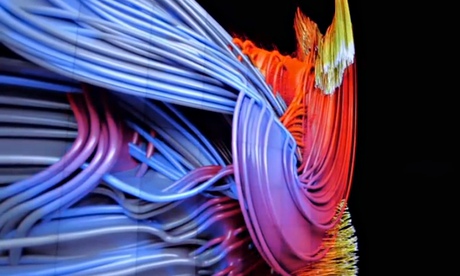
A group called Hack the Art World has created a virtual alternative exhibition to the Barbican's massive summer survey of computers and creativity, Digital Revolution.
Specifically, Hack the Art World objects to part of the exhibition that looks at Google's DevArt. This Google-staged part of the Barbican show is a "celebration of art made with code". Google is also a sponsor of the entire exhibition.
To be honest, looking at the Hack the Art World protest, it is hard to tell if they object to the idea of the event, or merely feel excluded. Their statement directly addresses Google and accuses it of inventing a glossy marketing name, "DevArt", for something that's been around for ages. "Art made with codes and computers has been around since the 1950s ..."
Yes, but the computers are a lot better now, right? That's probably why the Barbican and Google wanted to "celebrate" some of the contemporary results.
Hack the Art World go on to say they couldn't afford to enter the competition to exhibit in DevArt, too busy earning the rent, and that instead of spending money on a marketing idea like DevArt, Google should "buy our art instead".
In today's digital revolution-besotted world, it's not fashionable to point out that everything has a history, but the fascinating thing about Hack the Art World's attack on Google is how it re-enacts the dissident exhibitions that have shaped the story of modern art. This is a digital microcosm of the Salon des Refuses in 1863 that showed art rejected by that year's official Salon exhibition. Manet's Les Déjeuner sur l'herbe was among the modern masterpieces that made the Salon des Refuses so much more important than the official show that had spurned the Manet generation.
By the 1900s Paris had regular independent, avant-garde exhibitions, alongside its outmoded Salon. The hackers became the stars as modernism exploded in cubistic shards.
In 2014, there's still an allure in outsiderdom. The Barbican's "official" view of digital art has provoked Hack the Art World to create its virtual alternative. Similarly, a painting recently got masses of media coverage because it was "censored" by an art gallery. Leena McCall's Portrait of Ms Ruby May, Standing became an icon of controversy overnight, yet nothing about the story was really what it seemed. The showcase that rejected it was not, as the Independent reported, a "top London exhibition", but a sleepy event at the silly, square Mall Gallery (on the Mall). For a gallery to refuse to show a painting is anyway not "censorship", any more than it's censorship for a publisher to say no to someone's book of poems about their cat. It's an insult to writers and artists who endure state censorship to throw the word about like this.
Hack the Art World, like the great erotic portrait row, proves that being, or feeling, rejected is often a liberation for artists. Not to mention good publicity. But we don't really remember Manet's Dejeuner sur l'herbe because it was rejected by the Salon. We remember it because it happens to be great art.

